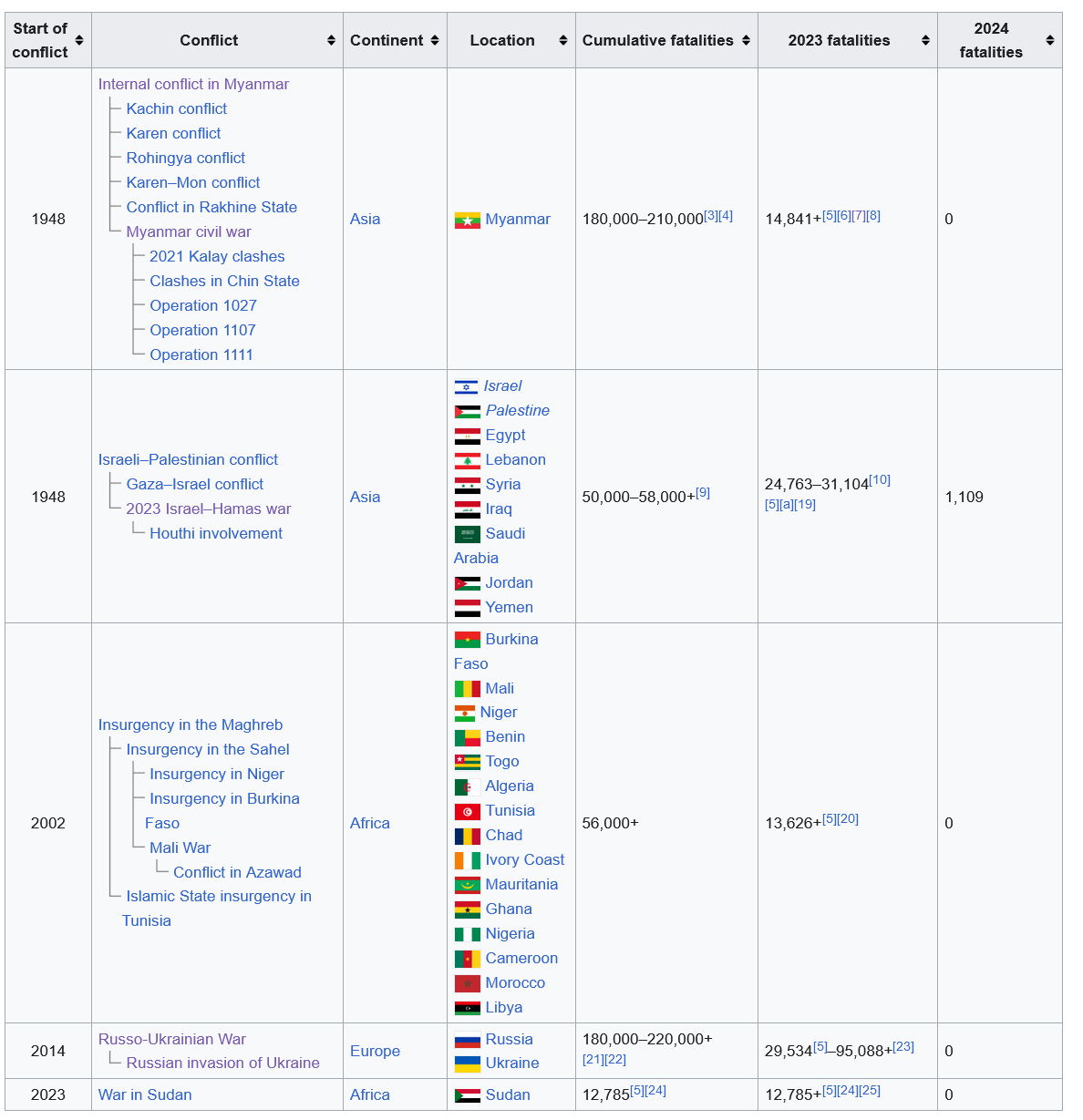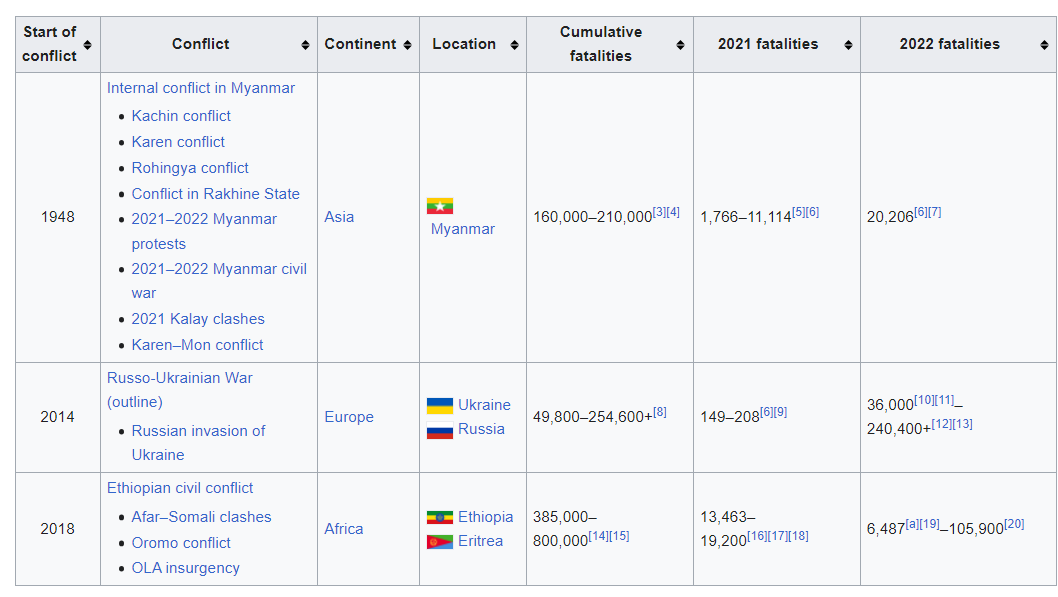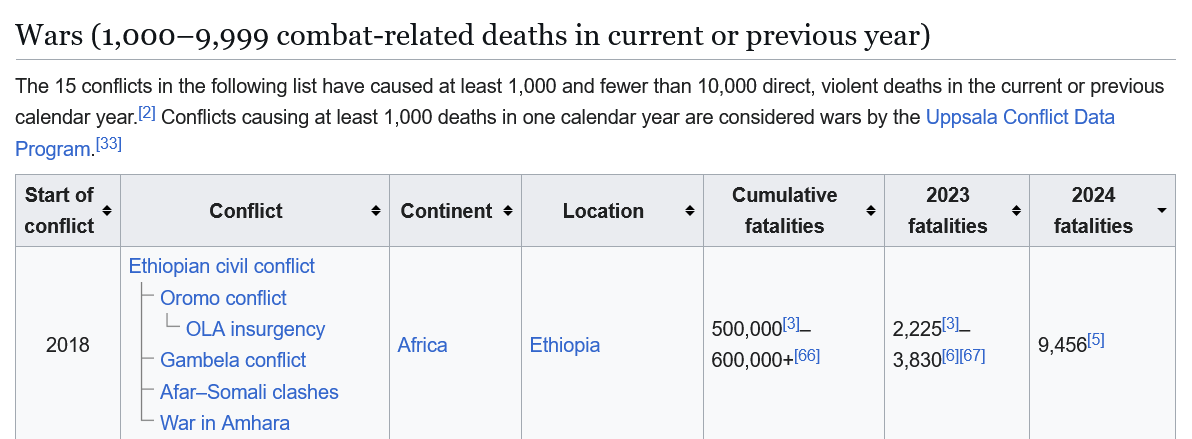
Market resolves YES if at the beginning of 2025, a new entry has been added to the "major wars" category of the Wikipedia list of ongoing armed conflicts.
Current list:

.
As Houthis vow to fight on, U.S. prepares for sustained campaign
Officials say they don’t expect operations in Yemen to last years, but they acknowledge it’s unclear when the group’s military capability will be sufficiently eroded
https://www.washingtonpost.com/national-security/2024/01/20/us-military-yemen-houthis/
I looked through the last 10 years of the article and at least one new major war was added in 6 of them (60%). Additionally, in the last three years, at least one conflict has been added every year for a total of 6. Market seems undervalued at 8%.
2023: +3
2022: +2
2021: +1
2020: 0
2019: 0
2018: +1
2017: 0
2016: +1
2015: 0
2014: 1
@Symmetry The issue is that the major conflicts are already underway. And those brewing will probably wait for Trump to be elected, and perhaps more clarity on the existing ones, before kicking off. The current conflicts may expand, but we probably wont see a major new conflict until 2025. Albeit, there are a bunch which could get pushed ahead of schedule, as war is, by nature unpredictable.
@Symmetry does "new entry" mean an entire new row with a new "start of conflict" date, or would e.g. an additional entry in the second column of one of the existing rows count?
In @Joshua's similar market (/Joshua/will-there-be-a-new-ongoing-major-w), a new row is required.
Edit: Since the 10k threshold for inclusion on the list seems to depend on the conflict as a whole rather than the individual sub-entries, I'm going to assume for now that an entire new row is needed.
@chrisjbillington Very good points. I will resolve this market as YES for any conflict that is added to the list that hasn't been there in 2023. It can be an escalating conflict that has been simmering for a while (for example the Israeli-Palestinian war) or a completely new one (Russia-Ukraine war).
It needs to be an entirely new entry. This is up to the discretion of Wikipedia editors. Should, for example, the conflict between Israel and Hezbollah escalate, I will only resolve YES if that gets its own entry, not if the Israel-Palestine conflict is updated into something else.
@Symmetry Thank you! That's great.
A final clarification: what you've said so far implies that an already ongoing war that was previously on the "major" list (prior to 2023) but that fell below the 1000 10,000 deaths/year threshold and was removed, if it rises above the threshold again and is re-added to the list, will count. Even though its "start of conflict" date would be pre-2023.
@Joshua has excluded most of these by saying that only new entries with a "start of conflict" in 2023 or 2024 will count. Are you intentionally including such flare-ups of older wars? From what you've said so far they are included, which is fine, but I want to make sure that's intentional rather than something unintended that could cause disagreement later.
@chrisjbillington Yes, exactly. Such a conflict would resolve to YES. I actually wanted to include the edge case but overlooked.
My intention with the market is to gauge the general "warlikeness" of the world, and for that it's irrelevant to me wether a conflict is truly novel or not.
Also past/latent conflicts are one of the strongest predictors for a future major conflict so I see no reason to exclude them.
Edit: One edge case I am unsure about would be the addition of conflicts that are criminal in nature and not political, as happened in the past with Mexican cartel violence. But in that case I would still resolve to the Wikipedia list to reduce arbitrariness on my part.
@Symmetry So just for clarification, if a new sub category is added to an existing conflict, that counts? I cant work out your comment about 3 being added last year, otherwise, given sudan is the only top level add
@ryansil For transparency: I checked January 5th for every year. In 2025, I will check the first few days until a clear consensus emerges. Sometimes the conflicts shuffle around a bit. That being said, on January 5th, 2023 the list looked like this:

So Myanmar, Ukraine and Ethiopia. Comparing that to the list in the question yields +3 new conflicts (Israel, Maghreb and Sudan)
@chrisjbillington Also a quick response to you to clear up confusion as I'm just seeing this. This market is about major wars, which require at least 10k combat-related deaths a year, not 1k.
